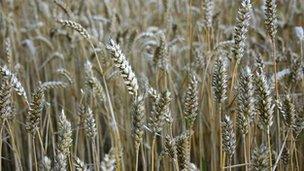Farm fears after rain affects crops, NFU Cymru warns
- Published
Farmers in Wales are facing a difficult year ahead after the unusually rainy summer hit crops and pushed up food production costs, a union has warned.
Fewer crops have grown and many of them are a poor quality, with grains going brown, rather than golden, and potatoes developing fungal infections.
NFU Cymru said farmers were also struggling because animal feed has become expensive.
The Welsh government said it was trying to help "lift the burden".
Like many parts of the UK, farmers in Wales have had to deal with an extremely unsettled summer, with June the wettest on record, its rainfall more than double the average.
Some farmers in Ceredigion were also affected by floods in June following torrential rain.
Ed Bailey, president of NFU Cymru, said that while farmers were used to the rainy Welsh weather, this summer had been"extreme".
"It's very much affected crops," he said.
"Initially we had a fair amount of hot and dry weather to germinate but now of course we need sufficient sunshine and people are telling me that the grains - things like barley - are absolutely dreadful.
"The quantity and quality are very poor.
"The grains are brown instead of golden. There's nothing really that thrives in this sort of weather. We have just had far too much rain."
Farmers in Wales grow crops to feed to their animals during the winter months. But a poor yield means they might have to buy in feed, which would add to their overheads.
"It pushes up costs as farmers are relying on grain and feed which has become expensive because of the poor harvest in the UK and drought in places like the USA and Russia," Mr Bailey added.
"I think it will only get worse and will go into winter. It's going to be a difficult year.
"You have to bear in mind everything depends on grain - bread, milk, beef, bacon. Food costs are going to have to go up."
'Rocketing'
Nigel Raymond, who grows potatoes near Fishguard, said a lack of sunlight had caused his potatoes to develop a blight problem, which is caused by a fungus and can lead to a large loss of crops.

Less crops have grown and what has been harvested is of poor quality, farmers say
"The poor weather, as well as making for a difficult start to planting, has led to exceptionally high blight pressure," said Mr Raymond said, who is NFU Cymru Pembrokeshire county arable chairman.
Meanwhile, Christine Jones, Anglesey NFU Cymru county chairman, said many pig farmers feared they will be forced out of business through a combination of "rocketing" costs.
She said the cost of feed was their "largest single expenditure" and accounted for "approximately 60% of the total cost of production".
"To date these pig feed ingredients, mainly wheat and soya, have increased in price by about a quarter following the heatwave and drought in the US, and delayed UK harvest has also meant tight domestic supplies," she added.
The poor weather is also having an impact on lamb production, according to red meat promotion agency Hybu Cig Cymru (HCC).
It said from May to mid August, the number of lambs going to auction in Welsh markets was approximately 30,000 - or 10% - less than for the same period last year.
John Richards, from HCC, said the weather meant there were less "fattened lambs".
Meanwhile, the Farmers' Union of Wales said farmers were fearful about delays in harvesting.
"We have had situations where farmers have started to cut a field when they get two to three good days, only to have to leave it half cut when more rain comes," a spokesman added.
The Welsh government said it had temporarily lifted restrictions which prevented farmers from using mechanical equipment and vehicles on waterlogged soil to help with harvesting.
Alun Davies, the deputy minister for agriculture, said: "The recent heavy rainfall has badly affected businesses as well as individuals and I am pleased to take this action to support farmers and play my part in slightly lifting the burden."
A Welsh Government spokesperson added: "We will continue to work with the unions with regards to the poor weather conditions and review any concerns the unions may have as a result of the weather and future derogations."
- Published14 August 2012
- Published10 August 2012
- Published10 August 2012
- Published30 July 2012
- Published8 July 2011
- Published28 April 2012